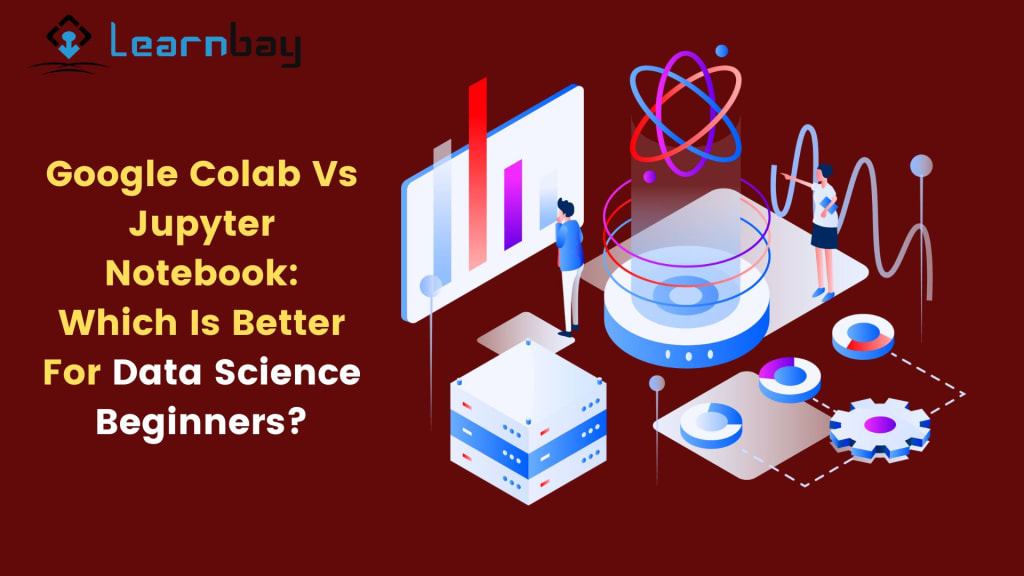Google Colab Vs Jupyter Notebook: Which Is Better For Data Science Beginners?
Google Colaboratory and Jupyter Notebook are powerful tools for collaboration when it comes to data science.

They are user-friendly, with graphical platforms that allow you to create and run code without needing expert programming skills or installing software libraries on your computer.
The differences in environment between Google Colab and Jupyter Notebook are also what make them unique from one another. While both can be used to help host research, it's essential to understand the various specifications of each tool before choosing which is better for your purposes. Much of that decision will likely come from the format and content you'll be working with.
In this article, I will tell you which is better for data science by comparing some of its key features and functionality. So let's get started!
What is Google Colab?
Google Colab is totally free and open source; you can use it without any charges on your cloud account. It is best used for smaller computational tasks for which you won't need the full power of your local machine. Using the Google Cloud Platform, we can access a wide array of Google-related services which we can use to solve problems through computing.
Features:
Google Colab is a collaborative software development platform that offers an easy way to develop applications using a variety of coding languages, including python. Google Colab helps users collaborate on code and content management via the Google Cloud Platform (GCP).
It has a built-in debugger, which allows you to see what code is running in the background without slowing down your program. This can be useful if you've written some code and it's not working correctly or if you need to debug something before actually running the program in production mode.
It has its own version control system called GitLab CEHQ, which lets you store all of your work on GitHub and keep track of changes made over time, as well as changes made by other users. You can even use this tool for collaboration with others who may not be familiar with GitHub CEHQ itself!
Visit the data science course in Chennai to learn more about how to use Google Colab and practice your codes here!
What is a Jupyter Notebook?
Jupyter notebook is an interactive computing platform for the web that is free, open-source, and was developed as a spinoff of IPython. Jupyter Notebook is a web application that enables users to create and share computation documents with one another.
Features:
1. Jupyter Notebooks are generally written in python, which makes them easy to read and edit by non-techies.
2. They can also be run on an individual's laptop or mobile device, making them ideal for data scientists working on various machines.
3. A Quick Comparison – Google Colab or Jupyter Notebook
4. If you're not sure about which tool to choose for your projects, here is a detailed comparison between Google Colab vs Jupyter Notebook:
5. Google Colab and Jupyter Notebook are similar tools that offer ways to use the Python programming language. However, in Colab, you can not install any module; you should have python installed on your Google machine.
6. Jupyter is a web-based interface that allows editing, sharing, and executing documents with code cells.
7. Colab and Jupyter notebooks provide a nice user interface to write code, plot things or insert interactive plots, share online and collaborate with others.
8. The Jupyter notebook was implemented in JavaScript, and the code is available on GitHub.
9. A Colab notebook can only run for 12 hours at a time. Idle sessions end far earlier than that.
10. Colab does not save any information about the environment (e.g. installed packages, files, etc.) Every new session necessitates a fresh set-up of the environment.
11. Colab has built-in version control and commenting features. While with Jupyter Notebooks, we must use GitHub/Bitbucket and ReviewNB to accomplish the same.
12. Even with premium Colab Pro/Pro+ subscriptions, there is no resource guarantee.
Reasons why Jupyter is Better – (My Opinion)
What I like most about Colab is its simplicity and ease of use. The best part is, you don't even have to install or configure anything. Here, you are spending most of your time on documentation, so if the tool itself adds complexities, it defeats the purpose. On the other hand, Jupyter Notebook comes with exciting features like LaTeX rendering and Markdown editing support.
First, the Jupyter Notebook has an easier learning curve. It allows you to write code directly in the browser and then integrates it with other tools and services like MATLAB or Python. This makes it easy to start using a new language or tool without learning all the ins and outs of that language.
Jupyter Notebook allows users to share their work with others more easily than Google Colab does. If you're working on a project with someone else, you can click "Share" and send them your notebook where they can see what you've done so far. They can also comment if they want or edit themselves if they're so inclined!
Google Colab has many additional features that make it more powerful than the Jupyter notebook (like live coding). But, they are also more challenging to learn because they require additional software (like MATLAB).
Final Words!
Colab is a great tool to use if you are conducting data science with python and big data. Jupyter, on the other hand, can be used for data science and to build documents. Both have their pros and cons. It all boils down to your specific needs right now, so there isn't a hard-and-fast rule to determine which one should be used over the other. If you're a data science aspirant, check out the data science and machine learning course in Chennai , learn the in-demand skills, and leverage them in your projects with the help of Google colab or jupyter. It all depends on your comfort!
About the Creator
Data science blogger
I am mallikarjun , a data science enthusiast and passionate blogger who loves to write about data science and latest technologies. I always believe in smart learning processes that help people understand concepts better,
Enjoyed the story? Support the Creator.
Subscribe for free to receive all their stories in your feed. You could also pledge your support or give them a one-off tip, letting them know you appreciate their work.






Comments
There are no comments for this story
Be the first to respond and start the conversation.